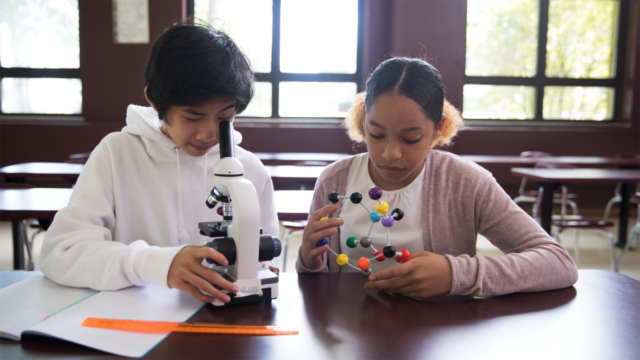
Photo: High school English teacher Leah Carper
Welcome back to Teachers in America, where we celebrate teachers and their lasting impact on students' learning journeys and lives.
In this 13-minute minisode, we are joined once again by Leah Carper, the 2023 North Carolina State Teacher of the Year. Leah is a high school English teacher who engages students through literature and dynamic classroom activities to teach them not only the standards but also how to be empathetic, contributing members of a global community. You can follow her on Twitter, Instagram, and TikTok.
A full transcript of the episode appears below; it has been edited for clarity.
You can follow Teachers in America wherever you listen to podcasts. Subscribe on Apple Podcasts, Spotify, Google Podcasts, Stitcher, or iHeartRadio.
Please consider rating, reviewing, and sharing Teachers in America with your network. We value our listeners' support and feedback. Email us at shaped@hmhco.com.
The views expressed in this podcast are those of the guest and do not necessarily represent those of HMH.
Noelle Morris: Welcome to Teachers in America, a production of HMH, where we celebrate teachers and recognize their triumphs, challenges, sacrifices, and dedication to students. I am the Senior Director of Community Engagement, Noelle Morris.
We’re starting off the school year with bite-sized episodes that feature back-to-school tips from your favorite former guests.
Today we welcome back 2023 North Carolina State Teacher of the Year, Leah Carper. Leah is a high school English teacher in Greensboro, North Carolina.
As her state’s Teacher of the Year, she is currently on sabbatical serving as an advisor to the North Carolina State Board of Education and visiting classrooms around the state.
In today’s minisode, Leah talks about everything from learning strategies that have been successful with her Gen Z students to universal free lunch. Now, let’s get to the episode!
Noelle Morris: What's the number one social-emotional learning strategy that, when you heard it, you were like, "Okay, I do that. That's natural. But I've never thought about it and its intentionality to bring it into my daily practice"?
Leah Carper: Absolutely. I've always spoken to every one of my students every single day. That was always a goal. And when you teach 160 students, y'all, when you teach that many every single day—we have a six-period day—when you teach that many students every day, it's difficult to make sure that you do that. So checking in is so important. And so, one of the things that they had us do, which seems so obvious, is stand by the door and say hello to everybody as they came in. And don't talk to them about their clothing or their hair; talk to them about something else. Because low-hanging fruit is like, "Oh, cool shoes." But not every child has cool shoes. So find something to speak to them about or mention or comment on that they know that you know them.
I learned more about my students through daily check-ins through my attendance questions. Pre-pandemic, I never took attendance saying everybody's name. "Billy, are you here?" "Here." I never did that. I was like, "Yeah, that kid wasn't here." But during the pandemic, taking attendance was so difficult because not every student had their screen on. I made it a point to take attendance verbally every day, but not here, here, here, it was, they would have to answer a question. And so, it would be simple things sometimes like, "What's your favorite color?" But then it went to things like, "Which one of these fast-food restaurants needs to go forever?" And it's wonderful because they are engaging with each other like, "Oh, that's right. That's me." Connecting with each other, with students they never thought they would connect with before. And then I'm learning more about them every single day. Things that I can talk to them about. Like, "Dude, I tried that Chick-fil-A® sauce plus Polynesian sauce combo like you told me to. That was bomb yesterday. Thank you for that rec." Things like that where they know I'm hearing them. And so it seems so simple. It seems so obvious. Speak to your students every day. But teachers are bogged down and it's very difficult to do that. So I had to take space. I had to take the time in my class. Three minutes every day, we're taking attendance. We're talking about which restaurant has the best ranch dressing. And it was wonderful.
Noelle: That's so simple and clever at the same time. But I also love how you can hear them justifying responses using clear details. You learn so much about argument and debate.
Leah: Oh, yeah. It's a writing exercise and they don't know it. I love tricking kids into learning.
Noelle: You like the sleuth way of teaching. What do you notice, Leah, and what are you thinking about with equity as you've gone across the state?
Leah: So, there are districts that have schools that have an entire aviation program and STEM labs and partnerships in their communities and local colleges, et cetera, and teachers who have tons of resources and a lot of that is funded. Our funding for schools in North Carolina is, I guess, different from other places in that the state has a per-student price they send out. But then a lot of it is paid by our local economy and so taxes, et cetera. And in districts where there's not even a Walmart in that school district, where there's nowhere to spend money because we have a lot of farms, —agriculture is huge in North Carolina—it is very different when it comes to the access students have to resources and classes. However, I will say that they all have access to tremendous teachers. And I'm not just saying that because I represent the teachers in North Carolina for this year. Their teachers are tremendous. I saw this teacher in this tiny, tiny little school and he was in charge of the agriculture program at the school. Y'all, they have cows at some schools and pigs that they raise. And their students are raising these animals at school every day, which I didn't think I was a big city girl, but that is not happening in my district in Greensboro. There are no pigs at schools in Greensboro. Not that I know of.
It's interesting to me, the programs, I guess is what I'm saying. The farming communities, the agriculture programs are bigger. The STEM programs are smaller versus in the cities it's different. And I think part of it is students want to do what their parents do. And I think that's noble and wonderful. But I also think that there's an equity problem with that because what if a kid in Greensboro really wants to be a farmer and vice versa? And so not just equity as far as resources, but also equity in opportunities. And that can be disappointing. And also something that I would love to see happen in North Carolina would be universal free lunch for everyone.

As North Carolina State Teacher of the Year, Leah serves as an advisor to her state's board of education advocating for education on multiple levels.
Noelle: I was reading about that the other day that that's a conversation.
Leah: Yes. And it happened during the pandemic. And there are districts who have it right now because of their financial situation. There are districts that barely meet that number that they have to meet. And it's so sad. It was so cool. It was never really on my radar as much and it should have been because I grew up super poor and I was on reduced lunch. It wasn't on my radar until I was teaching. And I noticed that that not being an issue for anybody really equaled the playing field. Lunch is for everybody. Everyone, come on, come and eat the food. And if a kid is hungry, we'll go get another lunch. And it's not an issue. It's not a money thing. There is a lot of shame when a student cannot pay for their food. I'll tell you a story, it's a personal story if that's okay.
Noelle: Oh, yeah.
Leah: When I was in high school, I was in ninth grade and I was standing in line for lunch, and I had my 40 cents in my hand. I had a quarter, a dime and a nickel. And I was standing in line for lunch and I was, I guess, jingling that money around or something. And I went to pay for my food and walked away. And the kid behind me said to the lunch lady, "Hey, she didn't give you enough money. I saw, she only had 40 cents. That's not how much school lunch cost. She needs to give you more money." And in ninth grade, I was humiliated. I'm not going to lie. I was so ashamed. I was embarrassed. Do I turn around and say, "Hey, sorry, my mom has five kids and she's ding-a-ling poor.” What am I supposed to do? And instead of it being an issue, the lunch lady, the sweetest little lady, she said, "Actually, this young lady gave me too much money. Here's your change." And she gave me back my 40 cents.
And that mercy that she showed me that day, that kindness that she showed me, that she took the shame away from being poor. And I know that you shouldn't be ashamed to be poor, but y'all, that's real, it's totally a reality that many of our students are facing. And so when I think about, "What if we could eliminate that stress? What if we could take that away from a kid?" That was a core memory for me. And I think about the little panic that I had every day in the lunch line that that would happen again. Every day of high school I thought that. What if that happens again? And there were some days I didn't eat because I didn't want to deal with it.
Noelle: I have tears in my eyes because I grew up with a single mom too. My father let us down quite a bit. And I have a lunch memory: he was supposed to pay my lunch fees and he didn't. 1984, just so different, no one thought about over-identifying. And my mother worked really hard. In that time, she didn't want us to be on free reduced lunch. And I was going through the line and I just thought my dad would come through. "He's going to come through this time." And same thing, I had my tray and I had to give my tray back.
Leah: Imagine having to take food away from a child.
Noelle: And then my best friend was like, "Okay, you can share my fries" or whatever. But again, that moment of how much of my energy was preparing for humiliation, that wasn't even something that I could control. It's just hard. But you carry that with you. And I'm sad that that happened for you, Leah, but probably has now opened your eyes in a lens of now what can you do to change that not happening to another child.
Leah: It changed my whole perspective on ways to treat human beings. And as a teacher, and as any educator in the building, this was a lunch lady. Every educator in that building doesn't know what day it is that they're going to create a core memory for somebody. There's so much that we carry that's heavyweight. But for someone, that was a regular Tuesday, and she probably thought, "That was nice of me." I hope she did. But she made a core memory for me. There's so much weight in that. There's so much power in our words and our actions with children. And if we could take the burden, it'd be great if parents all stepped up and did what they were supposed to do. But you and I are both products of that not always happening. And is it fair? Actually, is it appropriate to punish a child by making them starve because of their parents' actions?
And that's where mercy needs to come in. So that part of equity to me is huge. As I've been traveling, I always ask, "What's the lunch situation here? And what is your school doing to try to help?" My glorious district that I've been talking about, they have an alternative. They can't give the students the regular lunch if they have a huge lunch fee, but they can give them something. And so they have an alternative lunch that they will always give to students. And that's new this year. And it's wonderful that we could at least get something passed to where people won't starve. They will have carrots, they will have a sandwich, there will be something for them. And I'm grateful for that.
Noelle: The empathy, in teaching and in showing empathy. But the other side of that is like, "What's the mercy in the moment?"
Leah: Yes. Some of that is training. Some of that can be trained. You can teach people to be a little more aware, more culturally aware. More situational awareness is important to show that mercy. But some of it is the unteachable. And I think that a lot of the unteachable things are the things that teachers have, those qualities about us that make us so wonderful.
Noelle: If you or someone you know would like to be a guest on the Teachers in America podcast, please email us at shaped@hmhco.com. Be the first to hear new episodes of Teachers in America by subscribing on Apple Podcasts, Spotify, or wherever you listen to podcasts. If you enjoyed today's show, please rate, review, and share it with your network. You can find the transcript of this episode on our Shaped blog by visiting hmhco.com/shaped. The link is in the show notes. Teachers in America is produced by HMH.
The Teachers in America podcast is a production of HMH. Executive producers are Christine Condon and Tim Lee. Editorial direction is by Christine Condon. It is creatively directed, and audio engineered by Tim Lee. Our producer and editor is Jennifer Corujo. Production designers are Mio Frye and Thomas Velazquez. Shaped blog post editors for the podcast are Christine Condon, Jennifer Corujo, and Alicia Ivory.
Thanks again for listening!
***
Hear new episodes of Teachers in America on Shaped, Apple Podcasts, Spotify, or wherever you listen to podcasts.
We want you to feel confident teaching with our programs—and that comes with ongoing support. Teacher’s Corner gives you the support you want with an ever-growing library of professional learning resources from authentic classroom videos to tips from other teachers and our team of experienced coaches.
Chick-fil-a® is a registered trademark of CFA Properties, Inc.
Hear more from Teachers in America on Shaped.












